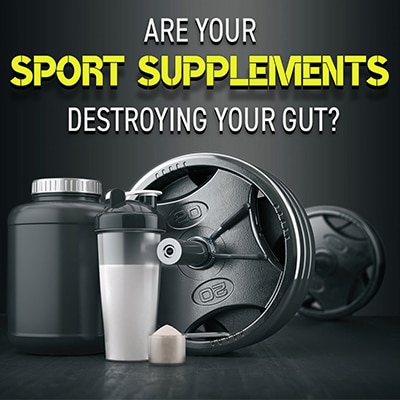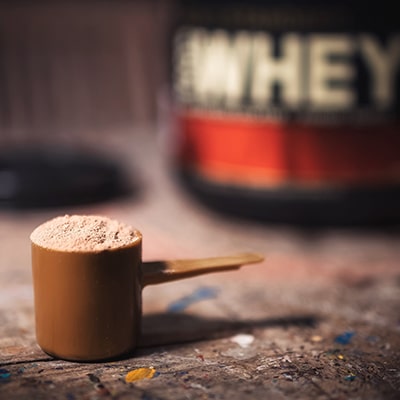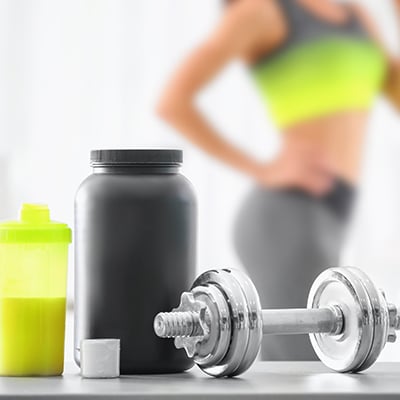Are Your Sport Supplements Destroying Your Gut?

Health coaches tend to sound like Hefty brand garbage bag commercials.
They use a lot of repetition to beat into your head what they’re trying to sell.
Instead of “Hefty, Hefty, Hefty,” you hear “protein, protein, protein.”
“Can’t get enough protein from your diet? Take a shake! More protein, less work!”
“Replace your meal or snack with double the protein!”
Eventually, though, you might start getting sick of your constant peanut butter, eggs, and chicken diet.
So to boost that protein intake and still get your gains, you consider taking a protein shake— but is it really safe?
There are a ton of other sports supplements, but protein shakes tend to be the most highly pushed.
So let’s learn a little bit more about protein and what you should know before choosing a method of protein increase.
Why is Protein Important?
Protein is a necessary macronutrient that helps your cells to function properly.
Amino acids are like chain links that when combined together make up different proteins.
Proteins can be used throughout your body as antibodies, messengers, enzymes, transporters, or structural components.
With all of these different actions, you can tell why your body needs so much protein in a day — 0.8g/kg of body weight to be exact.
Proteins do a lot of work with regulating your tissue function.
This is why proteins are so important to muscular health. If your proteins are working at their best, your muscles are able to as well.
What’s Actually in Your Protein Shake?

Protein, of course!
And a gazillion other things under that tiny word “ingredients” that mean absolutely nothing to you — but should.
Just because it’s your gym trainer, doesn’t mean they know much about nutritional health.
You should definitely do the research for yourself before choosing a supplement to use.
Non-Caloric Artificial Sweeteners (NAS)
Non-Caloric sounds awesome.
Fewer calories without sacrificing that sweet flavoring to make your tastebuds happy.
It sounds like a perfect substitute, right?
It really isn’t.
The word in the middle of the two that make you oh so happy is the enemy — artificial.
Artificial isn’t always bad, but more and more studies are coming out on different artificial products and linking them to different diseases.
One very extensive study started by using different artificial sweeteners on animals.
Three different types of artificial sweeteners were used between the group (saccharine, sucralose, and aspartame). Three control groups were used (water, sucrose, and glucose) to compare the differences.
In this part of the study, glucose intolerance was noticed at 8 weeks in the NAS group. After 11 weeks they were given antibiotics and the glucose intolerance was reversed.
When antibiotics help to reverse something, it indicates that bacteria are involved in the original cause of the problem — in this case, glucose intolerance.
This not only links the microbiome to this case of glucose intolerance but also proves that NASs can affect the microbiome.
The continuation of this study was on humans.
One large study was done on 381 healthy/non-diabetic people.
The study concluded that NAS consumption increased BMI, blood pressure, and fasting glucose levels.
In addition to these changes bacteria samples indicated an unfavorable change in the microbiome.
Lead
If you have little kids running around at home, you know that the doctor asks you at most checkups if your child has potentially been exposed to lead.
It’s obviously an issue if you are exposed to lead in any way.
Many of the top sports supplements were tested and found to have differing levels of lead and other toxic metals in them.
Some reasons you don’t want to consume anything with lead include:
-
- A decrease in stomach bile acids — stomach bile acids are necessary for cholesterol and energy metabolism along with preventing gut inflammatory responses
- Reduction of Vitamin E levels
- Creates reactive oxygen species (ROS) — leads to oxidative stress creating a higher chance for cardiovascular and other diseases
- Disruption of gut microbiota
Cadmium
Cadmium is interesting because it doesn’t affect both men and women the same way. One study showed that men are actually more sensitive to cadmium exposure than women.
High levels of cadmium have been found to increase liver issues and decrease the richness and diversity of gut microbiota.
Arsenic
There is really no shortage of reasons you should limit your exposure to arsenic. High arsenic levels have been linked to:
- Cancer
- Diabetes
- Cardiovascular disease
Arsenic — like cadmium — has stronger and worse effects on men than women. However, with one type of bacteria, women did have a more significant change than men.
Arsenic disrupts homeostasis and can cause dysbiosis of the microbiome.
The changes that arsenic creates in your microbiome lead to:
- Inability to use vitamins properly
- Oxidative stress
- Liver complications
- A decrease in the ability for DNA to repair itself properly
Mercury
Mercury is often found in deep sea fish. This is one of the reasons pregnant women should avoid high amounts of larger fish types.
High levels of mercury can have negative impacts on brain development.
It was recently found that this is due to microbiome activity.
When mercury is digested by the gut bacteria it can be turned into methylmercury which is a known neurotoxin.
High levels of mercury can also cause antibiotic resistance according to another study done on aquatic animals.
Effects of Sports Supplements on Your Microbiome
Increased gut permeability has been found commonly in those who take protein supplements.
The same process your body uses to increase muscle bulk is also the one affected by protein supplements to increase leaky gut.
The fermentation process of certain proteins can also lead to cancer, cardiovascular disease, and chronic kidney diseases.
Some people also experience severe digestive issues when taking protein supplements.
For those who have problems digesting whey protein, they may experience severe bloating, gas, stomach cramps and diarrhea/constipation.
Branch-chain amino acids (BCAA) are another common supplement people turn to for increased energy and appetite control.
While they work great for this, BCAA supplements have been found to increase chances of type 2 diabetes and non-alcoholic fatty liver disease.
This happens because BCAAs can increase plasma levels in the blood.
How to Avoid These Problems
1. Eat a well-balanced diet
It’s not anything new that we should be eating a wide variety of foods. Including prebiotics and antioxidants into your diet can help to give you some of the benefits that you’re looking for in sports supplements.
Adding nuts or other high protein foods can help to give you more protein and variety to your diet.
2. Check your supplements
If you still feel like your diet isn’t giving you everything you want or need, you can still add in supplements.
When deciding on what supplements to buy, make sure you check the ingredients to make sure they won’t be causing you harm.
If that sounds like too much work, check out NSF International to see if they approve the product you’re looking to use.
Products like Atrantil have the stamp of approval from NSF — meaning they’re safe and legal for athletic use. Atrantil helps to fight bloating and other gut issues while providing the essential benefits of prebiotics and antioxidants.
What products do you use for supplementation?
Have you noticed any gut related issues while using them? If so, drop us a comment below!